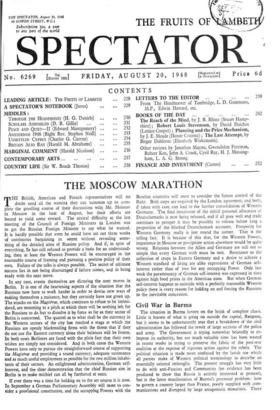THE MOSCOW MARATHON
THE British, American and French representatives will no doubt need all the stamina they can summon up to com- plete the gruelling course of their discussions with Mr. Molotov in Moscow in the heat of August, but their efforts are bound to yield some reward. The central difficulty at the last meeting of the Council of Foreign Ministers in London was to get the Russian Foreign Minister to say what he wanted. It is hardly possible that even he could have sat out three weeks of continuous bargaining in secret without revealing some- thing of the detailed aims of Russian policy. And if, in spite of everything, fie has still refused to provide a basis for an understand- ing, then at least the Western Powers will be encouraged in the reasonable course of framing and pursuing a positive policy of their own. Failure of the talks is always possible. The secret of ultimate success lies in not being discouraged if failure comes, and in being ready with the next move.
In any case, events themselves are dictating the next moves in Berlin. It is one of the heartening aspects of the situation that the Russians now have to work harder in order to devise new ways of making themselves a nuisance, but they certainly have not given up. The attacks on the Magistrat, which continues to refuse to be intimi- dated, are mounting to a pitch at which there will be nothing left for the Russians to do but to dissolve it by force so far as their sector of Berlin is concerned. The quarrel as to what shall be the currency in the Western sectors of the city has reached a stage at which the Russians are openly blackmailing firms with the threat that if they do not use the Eastern currency alone their balances will be frozen. In both cases Berliners are faced with the plain fact that their own wishes are simply not considered. And in both cases the Western Powers have only to pursue the straightforward course of supporting the Magistrat and providing a sound currency, adequate sustenance and as much useful employment as possible for the two million inhabi- tants of their sectors. An enlightened administration, German self- Interest, and the clear demonstration that the chief Russian aim in Berlin is to make michief can all be furthered at once.
If ever there was a time for holding on to the set course it is now. In September a German Parliamentary Assembly will meet to con- sider a provisional constitution, and the occupying Powers with the
Benelux countries will meet to consider the future control of the Ruhr. Both steps are required by the London agreement, and both, if taken with care, can lead to the further consolidation of Western Germany. The final instalment of the initial personal allocation Deutschemarks is now being released, and if all goes well and trade continues to prosper it may be possible to release before long a proportion of the blocked Deutschemark accounts. Prosperity for Western Germany really is just round the corner. That is the telling fact. It is because of this that, for the Western Powers, impatience in Moscow or precipitate action elsewhere would be quite wrong. Relations between the Allies and Germany are still not so simple that every German wish must be met. Resistance to the collection of crops in Eastern Germany and a desire to achieve a Western standard of living are alike expressions of German self- interest rather than of love for any occupying Power. Only last week the paramountcy of German self-interest was expressed in riots against high food prices in the American zone. But when German self-interest happens to coincide with a perfectly reasonable Western policy there is every reason for holding on and forcing the Russians to the inevitable concession.


































